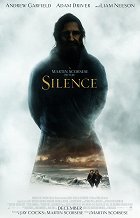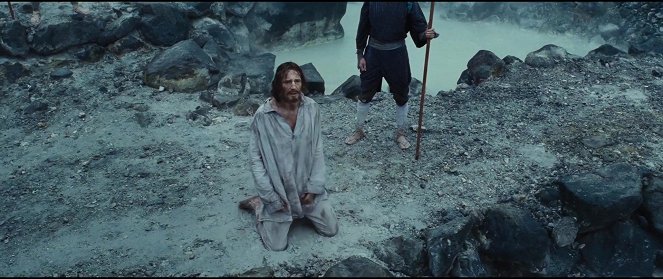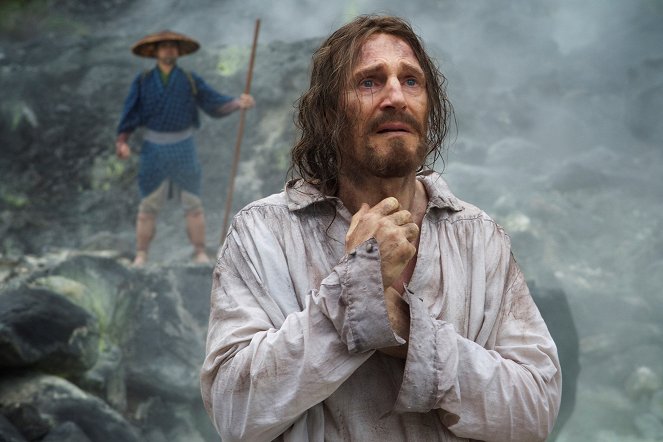Directed by:
Martin ScorseseCinematography:
Rodrigo PrietoCast:
Andrew Garfield, Adam Driver, Liam Neeson, 浅野忠信, Ciarán Hinds, Shin'ya Tsukamoto, Yōsuke Kubozuka, Ogata Issei, Hiroyuki Tanaka, Ryō Kase, 小松菜奈, 美知枝 (more)VOD (2)
Plots(1)
In the seventeenth century, two Jesuit priests face violence and persecution when they travel to Japan to locate their mentor and to spread the gospel of Christianity. (official distributor synopsis)
Videos (19)
Reviews (12)
One star for perfect cinematography, the rest fell victim to utter boredom and annoying Catholic propaganda. The answer to most of the questions asked by Father Rodrigues could be: "Because you came here forcing your delusions on us!" Fortunately, the Japanese did not make the same mistake as the Aztecs and Incas. They allowed the Catholics to become martyrs, thus avoiding the Conquista and the Holy Inquisition. The film was awfully long, and the story was so monotonous it dragged on like a snail soaked in honey. I wished the main characters a slow and painful death, and I was secretly hoping that one of the Japanese would finally run out of patience, reach for a katana and create a ‘pagan's cut,’ cutting the film shorter by at least a third.
()
If Martin Scorsese didn't have a hand in this, I'd probably avoid it in a big way. Unfortunately, I have to say that his contribution is not very good this time around, and except for about three very interesting camera shots, the whole film is very monotonous and at times drags incredibly. I understand what Martin Scorsese wanted to convey and it certainly has a concept. But in the end I suffered through the whole two and a half hours more out of respect for the director than for any other reason.
()
Personalities like Martin Scorsese have the power to make the general public interested in subjects they choose. Such a personal topic for Scorsese was the novel "Silence" by Shūsaku Endō, which he presented to Western viewers 45 years after its original Japanese adaptation Silence. However, it is very difficult to establish a personal connection to the story of Portuguese Jesuits on a Japanese mission in the 17th century. The spiritual atmosphere and beautiful landscape are certainly captivating, but A-list actors like Andrew Garfield, Adam Driver, and Liam Neeson are naturally more suited to a different context.
()
An artistic statement that is not as thought-provoking as The Last Temptation of Christ, yet it is a beautiful piece of filmmaking, thoughtful, with first-class visual compositions. My relationship with this film is ambivalent. The main characters – the Christian priests – didn’t have my sympathy because they were spreading the gospel in a culturally different country where no one asked them to (and where Buddhism was strongly rooted) and at the cost of immeasurable suffering for the common folk, bleeding and dying, but at the same time, this account of Scorsese as a deeply religious man is so honest that you have to admire it, even if you might be ideologically inclined in a different direction. Scorsese wanted more, to show that the people of the distant past deeply believed in symbols and that strongly rooted beliefs cannot be broken, no matter how hard the hostile environment tries. Everyone believes in something. Some believe in the power of nature, some in the power of family, others in the power of money, and Scorsese and other Christians in the power of the Christian God. And I, an ordinary person and a mere atheist, have no right to deny and question this belief. Although I will still side with Father Ferreira (Liam Neeson) and prefer the aforementioned The Last Temptation of Christ, which was deeper. PS: Garfield was brilliant. I was already intrigued by him already in The Social Network and I knew we would hear a lot about this guy.
()
After releasing masterfully crafted genre movies that won the favor of mass audiences, Martin Scorsese tried his hand at a more demanding project. And just like in The Last Temptation of Christ and Kundun, he turned his attention to religion. Built on dialogue, atmospheric shots of the given locations and subtle use of sounds, Silence is a slow film almost without any music. The structure is reminiscent of Coppola’s Apocalypse Now. Even as an atheist, I was surprised to enjoy the psychological analyses of the characters and the philosophical musings about the importance and consequences of faith, as well as the responsibility of its promulgators. Andrew Garfield is really, REALLY good.
()



Ads